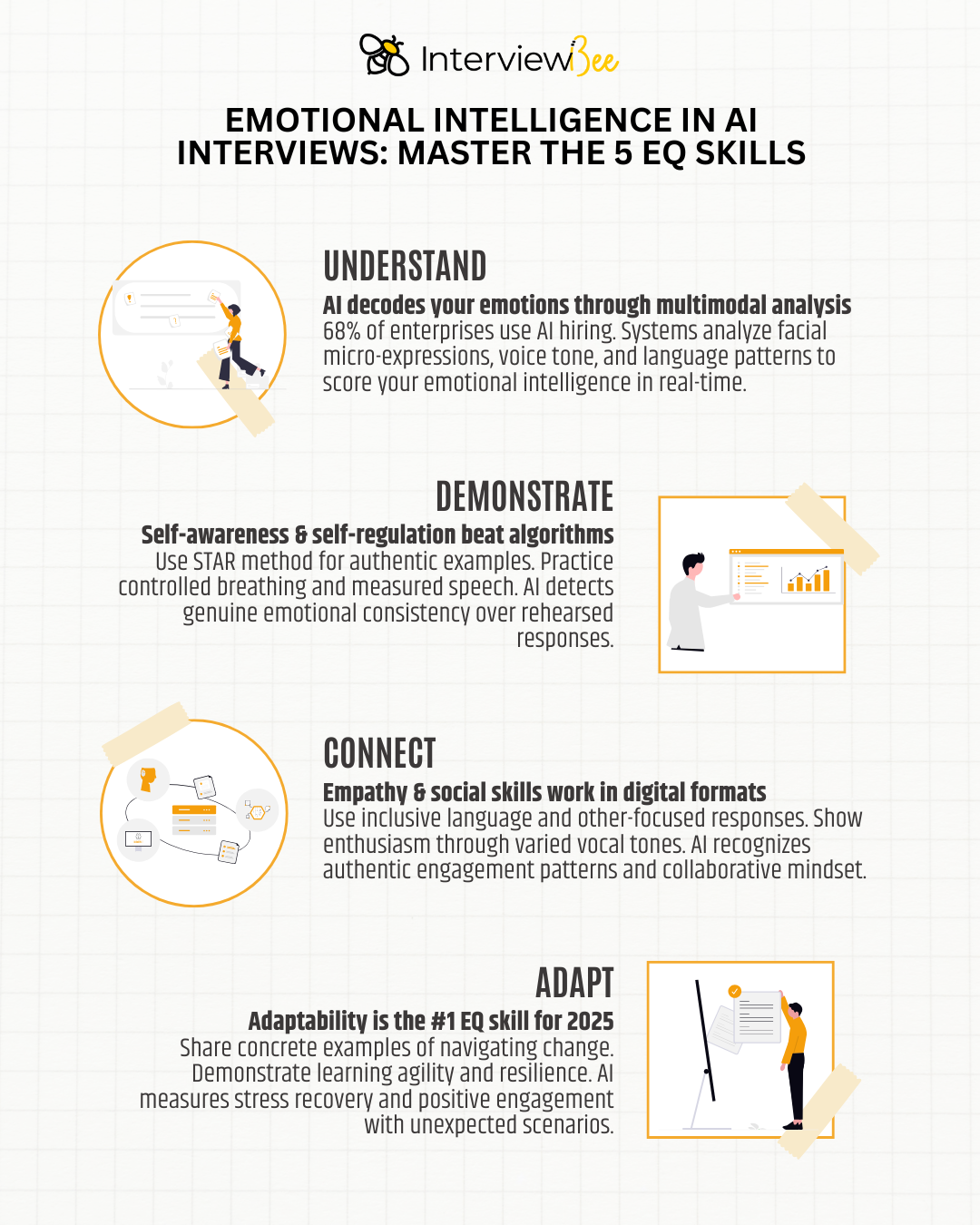
Beat AI Interviews: 5 Emotional Intelligence Skills 2025
- Author: Anindita Ghosh
- Published On: Oct 15, 2025
- Category:Interview Guide
The recruitment world has changed significantly in 2025. According to a recent Deloitte study, 68% of large enterprises are using AI in their hiring process. As AI interviews become standard practice, there is one important factor that will define success: your emotional intelligence and how you can prove it to machines that are programmed to understand human emotions.
The stakes are high. With 84% of employers valuing emotional intelligence and adaptability, and EQ making up 58% of job performance across all roles, emotional intelligence definitely is not an optional skill to master, but a key requirement for career success and mastering it in AI interviews.
How AI Algorithms Decode Your Emotions
The cutting-edge technology used by modern AI interview platforms such as HireVue and Pymetrics is sophisticated multimodal emotion recognition technology. These systems can simultaneously analyze:
• Facial micro-expressions and eye contact patterns.
• Pacing, pitch and voice tone
• NLP to analyze word choice and sentiment
The outcomes are self-explanatory: 80% of recruiters say that AI successfully assess emotional intelligence and 75% of companies experience faster hiring and 50% higher retention rates thanks to AI-based recruitment.
The 5 EQ Competencies That Outsmart AI
1. Self-Awareness: Your Foundation for Success
Self-awareness represents the cornerstone of emotional intelligence in ai interviews. AI algorithms analyze consistency between your verbal responses and non-verbal cues. When you genuinely understand your emotions and triggers, your authentic expression naturally aligns, something AI systems recognize as genuine.
Demonstrate it: Use the STAR method to share concrete examples of emotional self-recognition and growth. Discuss weaknesses honestly while explaining your learning journey. AI detects authenticity through micro-expressions and vocal consistency, making genuine self-reflection more valuable than rehearsed responses. Practice self-aware responses with InterviewBee's Mock AI Interviewer to refine your delivery.
2. Self-Regulation: Managing Emotions Under Digital Scrutiny
Advanced emotion recognition technology continuously monitors stress indicators, voice stability, and response timing. Self-regulation, your ability to manage emotions under pressure, directly translates to workplace resilience.
Demonstrate it: Practice controlled breathing, measured speech pace, and consistent emotional tone when discussing difficult topics. Share specific high-pressure situations where emotional control led to positive outcomes. Show AI systems that regulation isn't suppression but conscious emotion management.
3. Empathy: Digital Connection That Algorithms Recognize
AI systems analyze language patterns for empathy markers, looking for linguistic indicators of genuine concern for others' perspectives. In ai mock interview sessions, empathy must be both authentic and algorithmically detectable.
Demonstrate it: Use inclusive language acknowledging multiple perspectives. When describing teamwork scenarios, employ other-focused language demonstrating active listening and collaborative problem-solving. AI recognizes empathy through consistent use of supportive language and appropriate emotional responsiveness.
4. Social Skills: Building AI-Detectable Rapport
Social skills encompass communication effectiveness and collaboration abilities. AI evaluates these through speech patterns, engagement cues, and interaction quality, even in digital formats.
Demonstrate it: Show enthusiasm through varied vocal tones and ask thoughtful questions about company culture. Prepare examples showcasing successful collaboration, conflict resolution, and trust-building. AI recognizes social competency through consistent engagement patterns and genuine interest in teamwork.
5. Adaptability: Thriving in AI-Driven Change
Perhaps the most critical EQ competency in 2025, adaptability shows your ability to adjust to new situations and remain resilient. AI assesses this through your responses to unexpected questions and recovery from challenging moments.
Demonstrate it: Share concrete examples of navigating organizational changes or technology adoptions. Describe your learning strategies and how flexibility led to positive outcomes. AI measures adaptability through stress recovery patterns and positive engagement with unfamiliar scenarios
Strategic Tips for AI Interview Success
Understand AI's Limitations
Perhaps the most critical EQ competency in 2025, adaptability shows your ability to adjust to new situations and remain resilient. AI assesses this through your responses to unexpected questions and recovery from challenging moments.
Current AI struggles with cultural differences in emotional expression and complex emotional states. While it excels at identifying basic emotions, it has difficulty with mixed emotions or sarcasm. Present your emotional intelligence clearly and consistently, in ways AI can accurately detect.
Practice Authentic Expression
Modern AI systems increasingly detect authenticity versus rehearsed responses. Focus on genuine emotional intelligence rather than trying to manipulate algorithms. AI analyzes micro-expressions, vocal consistency, and linguistic patterns to identify authentic emotional expression.
Key preparation strategies:
• Maintain consistent eye contact with the camera
• Practice varied tones and clear articulation
• Ensure facial expressions align with verbal content
• Use AI mock interview platforms for realistic practice
• Prepare multiple EQ-focused STAR stories
The Path Forward
Success in emotional intelligence in ai interviews ultimately depends on developing authentic EQ competencies that serve you throughout your career. The future belongs to professionals who demonstrate genuine emotional intelligence to both artificial and human evaluators.
Rather than competing against algorithms, view AI assessment as motivation to develop real emotional intelligence, the kind that drives workplace success, leadership effectiveness, and personal fulfillment in an AI-integrated world.
Conclusion
The job market hasn't suddenly become impossible to navigate. It's just evolved. While AI systems analyze your micro-expressions and vocal patterns, your genuine emotional intelligence remains your competitive advantage. The candidates who succeed aren't trying to trick algorithms, they're developing authentic EQ skills that serve them in both AI-assessed and human-led interviews.
Want to practice demonstrating emotional intelligence to AI before your actual interview? InterviewBee's Mock AI Interviewer simulates realistic AI assessment scenarios with instant feedback on your vocal tone, response authenticity, and emotional consistency. Practice with adaptive AI questions that respond to your answers just like real hiring platforms. No credit card required to start. The question isn't whether you have emotional intelligence. The question is whether you're ready to demonstrate it to the algorithms evaluating your next interview.



